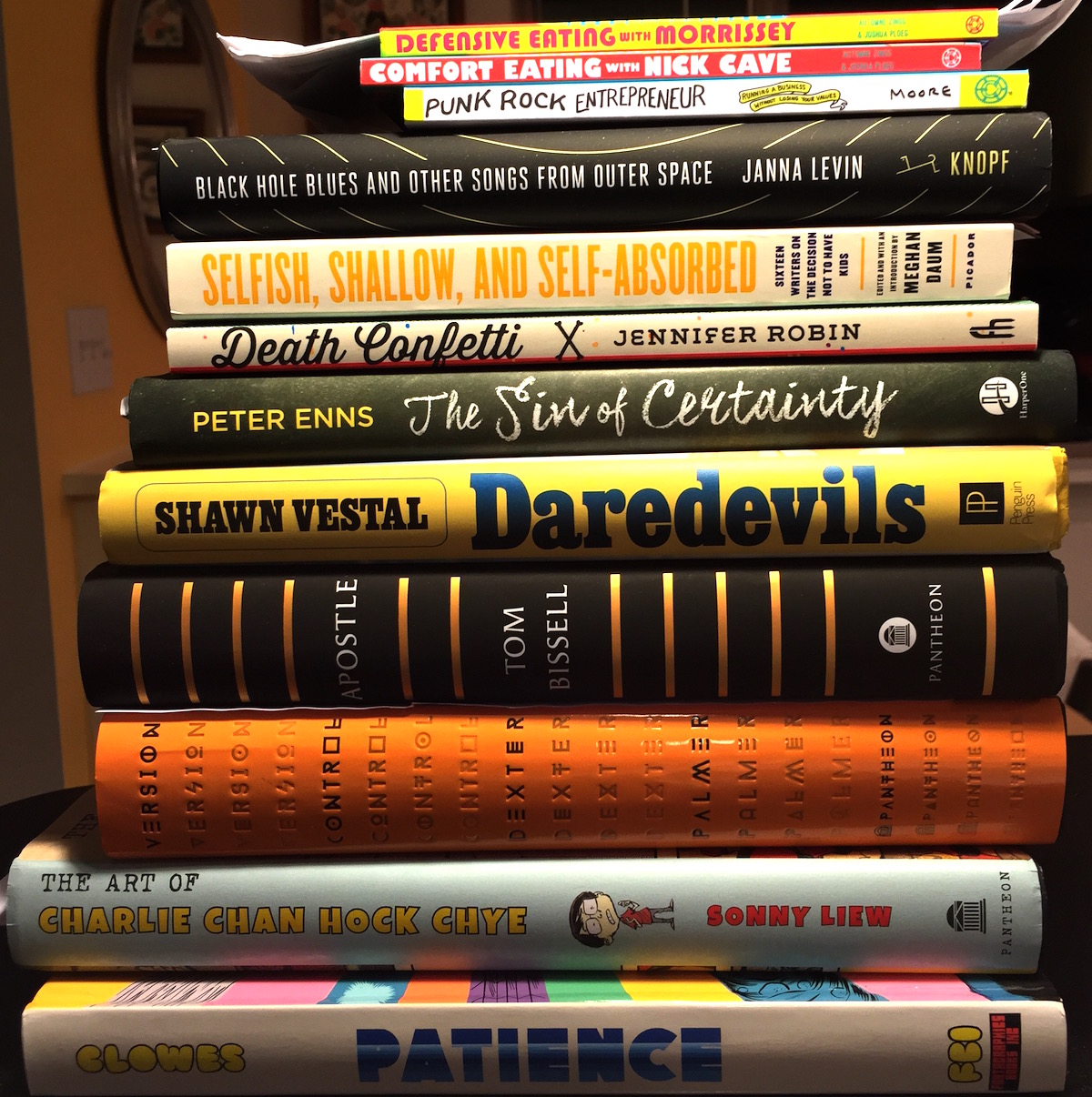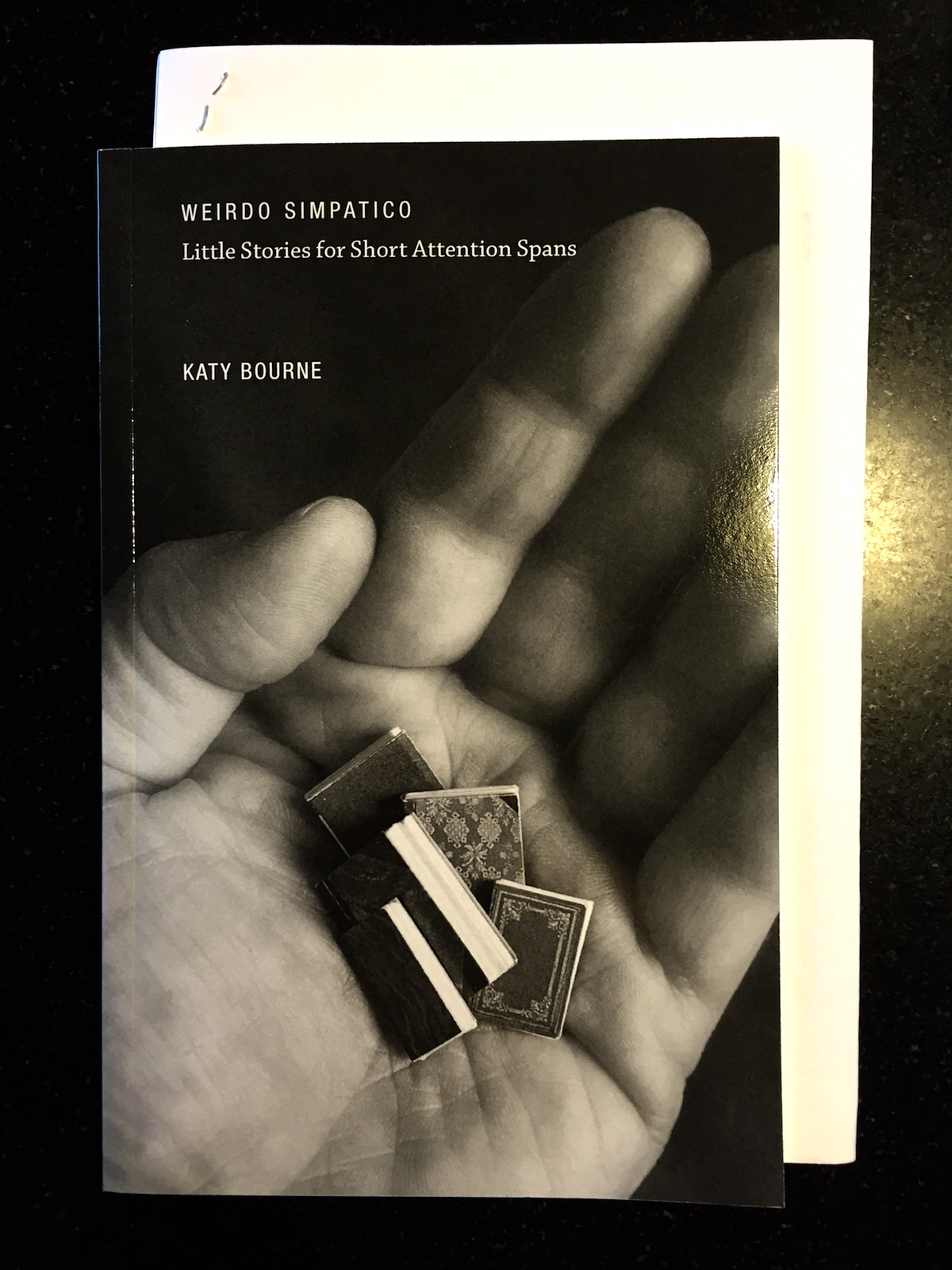Let's talk some more about Poetry Northwest
Poetry Northwest is one of Seattle's great treasures — a journal that's been publishing since 1959. We're thrilled to have them as a sponsor this week. Their upcoming issue — available the first week of April — is a must-read. Maybe don't judge it only by its cover, but that image by David Hytone is enough to get us excited. In fact, did you know that none other than Mark Tobey did their early cover art?
You can see some representative work on our sponsors page — it's worth your time. While you're there, click over to grab a subscription. If you're a poetry fan in Seattle and you don't already have one, now is time to remedy that.
If you're a small publisher, writer, poet, or foundation that is looking to back our work, and advertise your own in an inexpensive and expressive way, take a look at our open dates. We'd love to talk to you about opportunities to sponsor us. It's our way of making internet advertising something to look forward to.
Imagine a world in which booksellers can break into your home and steal back books that you bought from them. That, basically, is a reality with e-books. Chris Meadows wrote for TeleRead an account of how Barnes & Noble "stole" the first e-book he ever bought. He even contacted Barnes & Noble to complain, and they told him he could re-buy the e-book from them if he wanted. A couple days later, Barnes & Noble did decide to give Meadows back the e-book that he purchased. Awfully gracious of them.
Remember: you do not own the e-books that you buy from online retailers like Barnes & Noble and Amazon. You license them, and there's nothing you can do if the publisher decides to take the book back from your online library.
In related news, if you don't update your old Kindles by tomorrow, they'll be disconnected from the internet.
Here's what you can do to fight the inequality in Seattle Public School's libraries
All this month, I’ve been interviewing Seattle-area school librarians. They have, to a person, been delightful interviews: friendly, optimistic, and eager to talk about their work. Almost every one of them told me that they believe they have the best job in the world.
But they’ve also all talked about a problem that plagues every school librarian in Seattle. It’s a problem that is frankly unbelievable for a modern American city, especially one that considers itself to be as progressive as Seattle does. To be blunt: Seattle Public Schools' libraries are criminally underfunded. Not only are school librarians in Seattle all expected to perform a more than full-time job on a half-time salary, but there is no budget to buy materials for school libraries. As in, none.
When Kathleen Eads started as the librarian at Greenlake Elementary School, she was greeted by the school’s Parent Teacher Association with a $5000 fund to buy books. Much like any librarian, Eads was thrilled to receive such generous support — to put it in perspective, Greenlake Elementary School has roughly 350 students, so $5000 is a lot more than the $10-per-student minimum that national school library organizations recommend as the bare minimum for school libraries to sustain themselves by replacing lost, stolen, and damaged books, and buying new books to keep the collections fresh and relevant.
But Eads also knows that other librarians in the Seattle area aren’t so lucky. She says our school libraries are suffering from egregious inequality. When a librarian starts the school year, they’ll receive a certain amount from the PTA “and maybe if your principal is nice, he’ll give you some money from the discretionary fund.” Librarians share stories about school libraries in Seattle that have only $1000 per year for schools of 750 kids. Other Seattle Public School libraries get nothing at all. Librarians try to make up the rest of the funds by applying for grants and throwing book fairs, but they’re already expected to maintain collections, support teachers, and interact with multiple classes of students per day on a schedule that only allows them to be at work for a few days a week. Their time is already stretched way too thin.
And this inequality means that the schools that need library funds the most aren’t getting them. Eads says her “heart hurts because the kids who have books at home get funding, while the kids who don’t have books at home don’t get funding.” That divide in Seattle falls almost directly on north-south lines: the poorer schools to the south — the districts with more people of color — always suffer more than the schools in the wealthier, whiter neighborhoods to the north. Eads says we have “this crazy thing in Seattle where we pretend we’re not divided, and in reality we’re so divided on systematic levels.”
School librarians have discussed ways to share resources more efficiently and equally — they’ve entertained the possibility of well-supported school libraries from wealthier neighborhoods establishing a sister school relationship with libraries in apoorer neighborhoods. But experience has shown, Eads says, that “parents would not contribute as much [to the PTA] if they knew that their money would not go entirely to their school.” She pauses. “So that’s where we are now.”
Eads and other school librarians have founded a Library Equity Team over the last few months. They plan to work together to demand a $10 per student budget for every school in Seattle. But that’s a lofty goal — libraries have gotten short shrift in Seattle schools for a long time. Eads says that when the last Director of Libraries for Seattle Public Schools left, the position was not replaced. A part-time manager is now performing the duties for what used to be a full-time dedicated position.
Eads tries not to get discouraged, but it’s tough. “I feel like I’m alone in this mission at times,” she says. The fight for library equity is “really a grassroots movement. It’s really easy to think we’re never going to make a change, that we’re fighting a huge uphill battle.”
What can parents and concerned Seattleites do to make sure kids across Seattle get the books that they need? Eads advises “advocacy on a verbal level. Writing about it, going to school board meetings, hashtagging it, whatever it might be.” The recently created hashtag for the equity movement is #SPSLibraryEquity; Eads says that sharing your support on Twitter and Facebook would make a world of difference. And if you have any ideas on how to improve advocacy for our school libraries, Eads encourages you to contact her on Twitter @eadsreads or via email at kaeads@seattleschools.org.
Why, with all Washington state’s education problems, should libraries be a priority? For one thing, a school with a quality library is much likelier to succeed than one with a library in disrepair. Eads also thinks people should get involved in the battle for library equity because it’s a challenge with clearly defined goals. If Seattle properly funds its school libraries, she says, those libraries “can be a little beacon of light that would inspire” us to do better in other areas. If Seattle had the best public school libraries in the nation, for example, that would encourage us to look at other elements — special education, say, or arts programs — that can be improved.
No single signifier says more about a society’s commitment to learning than its libraries. Seattle can and must do better.
The Sunday Post for March 20, 2016
Using Nature as Inspiration, Architects and Designers Are Building Seattle's Biofuture
Kelton Sears on those giant Amazon balls downtown, and why they're both cooler than you probably think, and part of a new architectural movement that is not just about crazy architecture for its own sake.
Plenty of eye-catching dome-shaped conservatories exist in the world. But if you’ve ever been inside a conservatory, as pleasant as they are, you wouldn’t want to work in one. As ball-shaped structures go, conservatories are among the hot and sweaty variety. If you spent a couple hours on your laptop in one, the salty puddle dripping out of you would likely fry your computer. So, while Amazon presented NBBJ with an unprecedented opportunity, they also presented the firm with a heretofore unsolved problem.
For the answer, NBBJ again turned to nature.
“The solution was really pretty simple,” Alberda says, “It’s called the diurnal cycle.”
The diurnal cycle is a fancy name for a climate pattern that occurs during one full rotation of the Earth. For 12 hours a day the temperature inside the spheres will be kept at 68 to 72 degrees and the humidity just slightly higher than the Seattle average of 62. At night the temperature goes down to 55, and the humidity can go up 85 to 90 percent to be “a truly plant environment.”
The Journalist and the Troll: This Man Spent Two Years Trying to Destroy Me Online
Dune Lawrence on being harrassed by a very aggressive, and ethically promblematic, businessman, and the absolute nothing she can do about it.
I saw the photo first, me in a bloody wash of red with “RACIST” pulsing over my face. A couple of clicks brought me to this:
“In the darkest shadow of Bloomberg’s glossy office building in Manhattan, you may find a woman by the name of Dune Lawrence—a ‘journalist’ who has built a career on writing salacious articles about China.”
That was my introduction to TheBlot, a website I hope you’ve never heard of. The article went on and on: I’d been kicked out of China for poor job performance and eked out a living on minimum wage. My appearance was ravaged by “years of consuming hormone-packed fried chicken and stressing over money.” Now, I’d found a way to save my sinking career by writing negative articles about China and taking kickbacks from short sellers. In a cinematic scene set at Kentucky Fried Chicken, this Internet version of me laid out a strategy: “ ‘Bashing the Chinese could be a profitable niche for me,’ Lawrence said to a source while biting off a juicy chicken leg quarter at KFC. ‘The Chinese don’t vote, the Chinese don’t sue people, they just sit there taking the s---. How much better can it get? I am making a living out of it!’ ”
The Violin Thief
This is a crazy story by Geoff Edgers, about a stolen violin, and one suspect, who played the instrument in public, and got away with it.
He is dying, Q-tip elbows poking through a baggy shirt. Friends visit, spooning him ice cream and playing music. His daughters are around as well, stopping in after school, too young to process the grim scene. And there, carefully placed in the closet, out of view in the room his ex-wife has set up, is the Stradivarius.
Philip Johnson’s fingers are no longer strong enough to play any violin, never mind one so unforgiving. So he keeps the Strad in a plastic crate. The instrument is the only thing he has of value. It is also his biggest secret.
The Case Of The Missing Perpetrator
The one-and-only Rebecca Solnit on gender, passivity, and lack-of-clarity in language, where it counts the most.
In a detective novel, you begin in a state of ignorance and advance toward knowledge, clue by clue. The little indicators add up at last to a revelation that sets the world to right and sees that justice is done, or at least provides the satisfaction of a world made clear in the end. If detective fiction is the literature of disillusion, then there’s a much more common literature of illusion that aspires to deceive and distract rather than clarify.
A perfect recent example is the Center for Disease Control’s new and widely mocked guidelines to drinking. They are like a detective novel run backward—if you read them with conviction, you’d become muddled about what a woman is and how violence and pregnancy happen and who is involved in those things. On the other hand, if you read more carefully, you might know why the passive tense is so often a cover-up and that the missing subject in a circumlocutionary sentence is often the guilty party.
Zentropa, a Graphic Novel 30 years in the making - Kickstarter Fund Project #11
Every week, the Seattle Review of Books backs a Kickstarter, and writes up why we picked that particular project. Read more about the project here. Suggest a project by writing to kickstarter at this domain, or by using our contact form.

What's the project this week?
Zentropa, a Graphic Novel 30 years in the making. We've put $20 in as a non-reward backer
Who is the Creator?
What do they have to say about the project?
A new Si-Fi epic in the tradition of the old Heavy Metal Magazine comic strips.
What caught your eye?
First, the artwork is crazy. It really is in that tradition of Heavy Metal (the magazine), which despite its rampant over-sexualizing of women characters, published some freaky, freaky shit. Comics that would take you places no others did, that would visualize strange mechanisms, and creatures, and nightmare situations that hung on a hybrid web of fear and wicked-cool visuals.
Mahoney's work certainly recalls that. He's a professional artist, so there's not much of a surprise there. But what is more surprsising is that he's started and given up on making comics many times in his life. It was only after having a large life-threatening tumor removed that he decided to knuckle down and make his dream project.
And his dream project, inspired by his hospital stay, sounds like it contains nightmares.
Why should I back it?
If you want one of those books you can look at, and look at, and look at, getting lost in the line work and thinking about how cool it is, then this book is for you. The thing is, this style is just not seen anymore in the comics world. It's nice to see something so starkly different.
How's the project doing?
Great. 18 days to go, and they've raised about 230% of their goal. Don't give because you feel guilty, give because you want a copy.
Do they have a video?
Kickstarter Fund Stats
- Projects backed: 11
- Funds pledged: $220
- Funds collected: $140
- Unsuccessful pledges: 0
- Fund balance: $820
APRIL Managing Director Tara Atkinson to step down
Tonight's APRIL Festival 5th Anniversary Party was a solid mix of new-to-APRIL readers (Hannah Sanghee Park delivered a witty spray of poems about love and "going to town on a tangerine") and longtime APRIL favorites (Ed Skoog always classes up a room, even when he's reading a poem about puppets). But they saved the real news for the end of the night: APRIL co-founder Willie Fitzgerald announced that APRIL's managing director, Tara Atkinson, would be stepping down after this year's festival.
After 5 years, our managing director @t_m_at will be leaving to grow her family & career. We can't thank her enough! pic.twitter.com/ko2h1zb6YU
— APRIL Festival (@APRILfestSEA) March 19, 2016
Atkinson is one of the creators of the festival and has been a guiding force ever since. She's been instrumental in the logistics and planning of APRIL, and she has been described to me on more than one occasion as the glue that holds the whole thing together. Her presence will surely be missed in upcoming festivals.
But while Atkinson is obviously irreplaceable, this moment marks a great opportunity for APRIL. Five years in, the festival has clearly defined what it stands for and what its aesthetic is. It is now, thanks in no small part to all Atkinson's work, conceptually durable enough to take on new voices and visions. If you've ever wanted to take part in one of Seattle's most defining literary celebrations, now is the time to get involved with APRIL. Sign up for the mailing list, attend at least one of the three remaining events this weekend, and talk to staff about volunteering. After five great years, APRIL is about to undergo an organizational change, and you can be a part of it.
Love Canal
In the end, our bones say a lot about who we were.
Ways of identifying sex lie in the shape of the pelvis, the jaw. If you place a thumb in the socket of a pelvic bone and it’s a tight fit, it belongs to the body of a male; female pelvic sockets are roomier. You can tell if someone was right-handed or left by the extra musculature attached to the dominant side. Lines along the femur record just how much of your life you spent running.
Your mouth and hands show how you spent your time. If you played a woodwind instrument, like the clarinet, the bones around the jaw show it. You can often tell a carpenter by the mouth, too — clipped front teeth from holding nails between clenched lips. Politically incorrect forensic archaeology textbooks claim that Caucasian nose holes are triangular, Negroid's square, and Mongoloid's diamond-shaped. I once ate a handful of psychedelic mushrooms with a boy I wanted to kiss and stared at my drowned body in a bathroom mirror. I was surprised to discover my nostrils were trapezoids with filaments of seaweed streaming from them.
Bones speak volumes about how you breathe. Your sternum is an archive of all you let go. Exhalation marks the body. Opera singers have extra muscular attachment to the ribcage, as do yogis. The residue of falsettos and fire breath. Shallow breathers have almost no perceptible traces of diaphragm or lung attachment at all. A lifetime of taking in the world but never forcing anything back out. If your baggage is what you hold in, just know there’s no use taking it with you.
In the end, no one can tell all that you carried.
Your mortal remains will stick around longer in Death Valley than Love Canal. The rate of decomposition depends on where you’re buried. In a posthumous land grab, if you want to max out your welcome on terra firma, secure a plot with Grade A alkaline soil. Think desert. Acidic soil accelerates decomposition, alkaline slows it.
In the 1950s the Hooker Chemical Company pumped the Love Canal section of Niagra Falls with 22,000 tons of dioxins from perfumes and shoe rubber. Thanks to physical abnormalities caused by poisoning, the graveyards in Love Canal are filled with twenty percent more appendages and teeth than the average burial site.
I immediately run and tell the most optimistic person I know. We have a lifelong bet going — one of those human nature deals where I’m the wet blanket.
“They poisoned thousands, turned them into mutants,” I say. “Can you believe there are people that terrible? Imagine I’ve grown up in Love Canal. Imagine I have eleven fingers and I’m about to die of some horrible cancer.”
She sucks the head off her beer and shrugs.
“When you’re gone,” she says, foam mustache lining her upper lip, “there will be more of you to miss.”
The Help Desk: Oh, the guilt!
Every Friday, Cienna Madrid offers solutions to life’s most vexing literary problems. Do you need a book recommendation to send your worst cousin on her birthday? Is it okay to read erotica on public transit? Cienna can help. Send your questions to advice@seattlereviewofbooks.com.
Dear Cienna,
Sometimes when I buy books from used bookstores, I feel bad, especially if they're from small presses. Authors get royalties, however small, on each book sold new in bookstores. They get bupkis from used book sales. Maybe this doesn't matter so much for James Patterson, but when I buy a used copy of an indie title with a tiny print run, that sale could have gone a long way toward benefitting an author, or at least helping their self-esteem. Am I being too sensitive? Or should I only buy copies of bestsellers in used bookstores from now on?
Ingrid, Crown Hill
Dear Cienna,
I like readings. The one problem is I feel guilty if I go to a reading and don’t buy the book. What’s the etiquette here? Is there a rule of thumb? There are so many variations to this theme: sometimes you like the book and will considering buying it later; sometimes after a reading you decide you don’t like the book; sometimes you like the book but it’s too expensive.
I keep coming up with other examples from my life. Is it okay to tell an author you’ll get their book from the library? And what if the author at the reading is your friend?
My anxiety grows by the minute, Cienna. Only you can help me.
Effie, Mountlake
Dear Effie and Ingrid,
Guilt should be reserved for religion and select situations that deserve it, like telling a Girl Scout you have a tumor just so she will give you a free box of Thin Mints. To answer your questions:
Buying any and all books from used bookstores is fine. Authors also get nothing when you lend a book to a friend or check a book out from the library. Think of it this way: If those books weren't being recirculated, they'd be rotting in basements, used as coasters in bars or burned by people like me.
First and foremost, writers are thrilled to have butts in seats at readings. You are basically doing a very specific community service for one very grateful individual when you attend them. That said, you shouldn't ever feel obligated to buy a book. If your misplaced guilt overwhelms you, however, there is a compromise: When I attend readings and the book doesn't grab me but I really liked the author, I try to think of a senile aunt or friendly shut-in who might enjoy its content and buy it for them as a gift.
That said, yes, you are absolutely required to buy your friends' books if they are published authors. It is a $20 investment. If you are not willing to invest $20 in friendship, you do not deserve to have friends.
Finally, I would encourage you both to ruminate on the nature of guilt. I am concerned, based on the tenor of your questions, that neither of you has truly experienced this proverbial shit stain in the rich tapestry of human emotions. Guilt, when done right, should feel like running a coal mine marathon: You should be sweating more than normal and overwhelmed by a claustrophobic sense of hopelessness.
I recommend that you explore this feeling, either by looking someone in your life in the eye while you tell them that you love them and then taking it back 10 minutes later, or by actually running a coal mine marathon. Then you both will be better equipped to tackle slightly uncomfortable social situations, like how to conduct yourself at a book reading, in the future.
Kisses,
Cienna
Poetry Northwest announces new editors, a new publishing imprint
We just received some exciting news from Poetry Northwest, the longest-running poetry magazine in the Pacific Northwest. There are three huge announcements, so let's tease them out in order.
First of all, longtime Poetry Northwest editor Kevin Craft is stepping down. Craft has long been a faithful ambassador, cheerleader, and ringleader of the Northwest's poetry scene. You'll find him in the stands at major poetry events around Seattle all the time, catching up with local poets and making introductions. He's also guided Poetry Northwest through a couple tough recessions and an ever-more-unsupportive culture for the arts — no mean feat. But before we get too far down the road of eulogizing Craft, let's talk about his replacement.
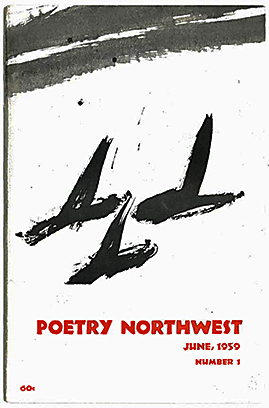
But Craft's not leaving town. Hell, he's not leaving Poetry Northwest. In fact, he's becoming the executive editor of a brand-new publishing imprint called Poetry NW Editions. Next year, the line will launch with Seattle poet Sierra Nelson's second collection, The Lachrymose Report. Nelson is incredibly active in the Seattle reading scene, and she has been criminally underpublished. As one of the treasures of Seattle literature, she absolutely deserves to be the point person in a brand-new publishing line.
Finally, Craft's last issue as editor of Poetry Northwest is just about to hit the stands. Among other features, it includes a host of great poets — Laura Da', Richard Kenney, J. W. Marshall, Claudia Castro Luna — and cartoonist Kelly Froh illustrating poems by Rebecca Hoogs and Rich Smith. If you've never read Poetry Northwest, this is the issue to start. It's always exciting when a long-running institution like this comes under new leadership; that balance between honoring traditions and sweeping out the institutional cobwebs is a kind of editorial highwire act. This is going to be a lot of fun to watch.
Washington State Poet Laureate Tod Marshall announced that he's looking for new poems (PDF) from Washington poets for a book titled Washington 129. Unsurprisingly, he'll publish one poem from 129 different poets — that's one poet for each year of Washington's statehood. The gist of the announcement:
Washington 129 is accepting submissions until January 31, 2017. Previously published poems will not be considered. Please submit no more than three poems as a single Microsoft Word attachment or as the body of an email to submissions@humanities.org.
Winners include:
- In poetry, Ross Gay, author of Catalogue of Unabashed Gratitude, wins.
- The super-reflexive National Book Critics Circle Award for Criticism goes to Maggie Nelson for The Argonauts, which Cate McGehee reviewed for us a couple months ago.
- The autobiography award goes to Margo Jefferson for Negroland.
- The winner for biography is Charlotte Gordon, author of Romantic Outlaws: The Extraordinary Lives of Mary Wollstonecraft and Her Daughter Mary Shelley.
- Sam Quiñones's Dreamland: The True Tale of America’s Opiate Epidemic won for non-fiction.
- And Paul Beatty's excellent novel The Sellout won the fiction award. I reviewed The Sellout last year for Seattlish. It was obviously one of the best books of the year, a satire about race so sharp that it might cut off your fingers if you pick it up wrong.
This is a fine list of great books — perfect for the moment when you're standing in the bookstore wondering what you should read next.
Portrait Gallery: Mal DeFleur
Each week, Christine Marie Larsen creates a portrait of a new author for us. Have any favorites you’d love to see immortalized? Let us know
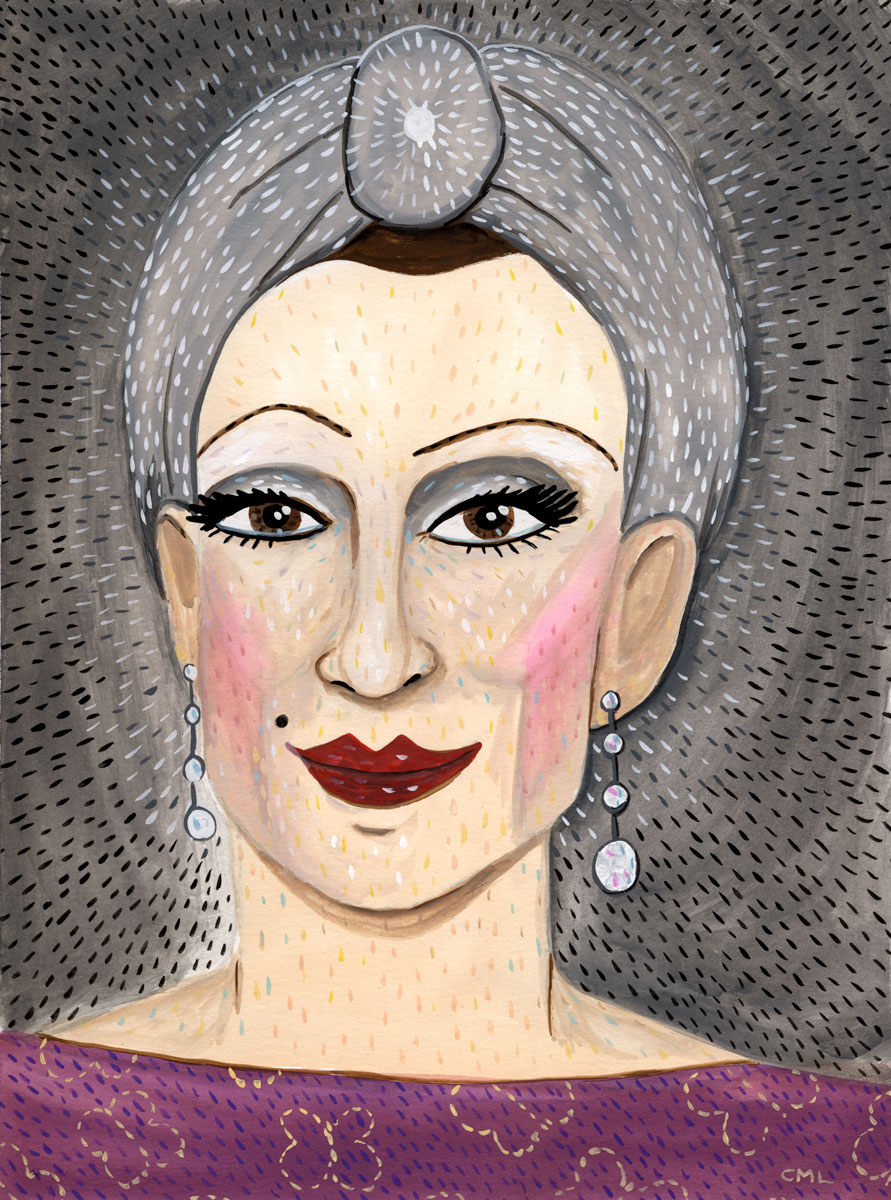
Mal DeFleur will be appearing tonight as part of APRIL Festival's annual event "A Poet, a Playwright, a Novelist and a Drag Queen". Miss DeFleur, the drag queen, will be appearing with EJ Koh, the poet, Sara Porkalob, the playwright, and Brian McGuigan, the novelist/memoirist. Doors open at 7:30. Tickets are still on sale, but this event does sell out, so act fast.
Book News Roundup: Bookslut publisher comes to town
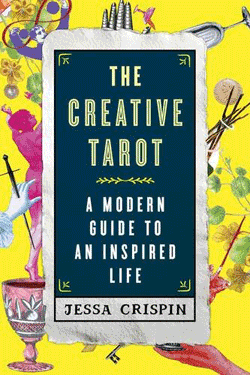
Rumpus: Do you dislike American literature?
Crispin: Oh my god, so much, right now? Are you fucking kidding me? I haven’t read a novel that’s come out of America that I thought had any value whatsoever since Kathryn Davis’s Duplex, which was two years ago, and there had been a drought before that as well. I think American literature is in a tedious place, horrible place. I can’t even engage with it.
Seattle poetry statisticians the Vis-a-Vis Society have published some of their most recent work on their website. Recent projects include a race between ending phrases and a spaghetti western.
Zainab Akhtar, founder of the popular comics criticism blog Comics & Cola, announced that she's shutting down the blog because the culture has become too "toxic."
Being a woman, being Muslim, being brown, and writing about comics in a culture that is inherently hostile to your presence- I'm empty
— Zainab Akhtar (@comicsandcola) March 16, 2016
Director Michael Mann is launching a publishing imprint called Michael Mann Books. One of the first books will be a prequel to Mann's film Heat.
If you read this story about awesome publisher Dalkey Archive Press's recent move to Texas and you don't fall immediately in love with Dalkey Archive Press, you're probably on the wrong website.
Everybody's straightening like it's a commercial
Published March 17, 2016, at 12:00pm
"Does this spark joy?" Marie Kondo implores us to ask of the things in our life. Dawn McCarra Bass stretches that idea to include some of the things that come to us through hardship and change.
Thursday Comics Hangover: Love at first sight
Artyom Trakhanov, where have you been all my life? Trakhanov is the artist for a new miniseries from Boom! called Turncoat, and his art is unlike just about anyone working in the American comics business today. Trakhanov’s art is along the lines of European comics artists, (which makes sense, since he’s Russian) meaning it’s obsessively detailed, focused on different kinds of panel-to-panel transitions than American counterparts, and packed full of interesting, unique characters. It’s unbelievably pretty, yes, but it’s also dense and ornate, like a woodcut come to life.
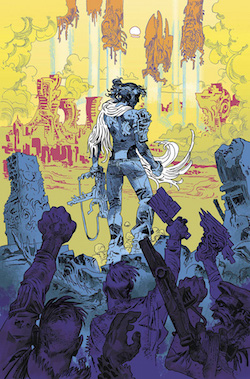
It’s not fair to the rest of Turncoat’s creative team that I can’t stop talking about Trakhanov’s art. It’s a sci-fi noir about a human woman who served on the police force for an invading alien force (called “the management”) before betraying her alien masters to a resistance force. The aliens, after 300 years of domination, are finally forced off the planet thanks to information supplied by Marta. This leaves her in a precarious position, as a friend tells her early in the book:
This won’t be clean, Marta. You know that, right? Lotta bad people lived too well under management to just hand over the keys to the world….Timing’s everything, pal. You gave us what we needed to hurt ‘em where it hurts, sure, but you did it just a touch too close to the end. Now both sides are gonna take you for a carpetbagger.
Five years later, Marta is a lonely woman, a private detective who gets assaulted randomly by both former pro-human resistance forces and alien sympathizers alike. She takes on a case that smells bad, and early clues indicate that it might lead to the management’s return. Alex Paknadel’s script is very strong — packed with information without feeling leaden — and it juggles genre tropes with a delicate touch. Paknadel could probably carry a lesser artist with his novelistic approach (there are more words per page than you’d find on five or six pages of your standard Marvel comic) but with an artist as naturally gifted as Trakhanov, it takes a couple readings before you realize how well-written the whole thing is.
Turncoat is walking down a dangerous path. It’s easy to imagine the many alien invasion/private detective clichés that the script could fall prey to in its remaining three issues. But as long as Trakhanov continues to draw the series, every issue will be, at the very least, worth the cover price just in terms of sheer stare-worthiness alone.
Tonight is the monthly meeting for SCBWI of Western Washington (Society of Children's Book Writers and Illustrators), and the topic is diversity. Anybody who follows the children's market knows that diversity is a huge issue right now. From Marley Dias to George Washinton's slaves, this is an important issue to explore in depth, especially from the point-of-view of creators. A great panel, including Philip Lee of Lee & Low Books, Kelly Jones, KCLS librarian Ann Crewdson, and Liz Wong, will be on hand to explore and offer suggestions.
Even better, librarians get in free tonight, so come one come all to Demaray Hall at SPU. Program starts at 7pm. And, I'll be there too, so come find me and say hello.
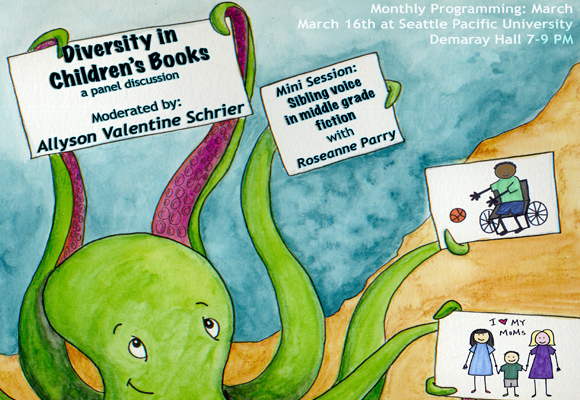
Nate Hoffelder at the Digital Reader reports that Barnes & Noble is dropping its Nook e-reading service in the United Kingdom. If you own a Nook e-reader, that could turn out to be a real problem. For one thing, you might not be able to access your books anymore. For another thing...
...if you should have to reset a Nook UK device in June, you won't be able to reauthorize it to the same account. And if someone gives you a Nook UK device in June or later, you won't be able to log in using your current credentials. And since B&N requires that a Nook device be authorized before you can use it, that is a problem.
Not to be a dick, but you literally never have to worry about this kind of thing with physical books.
The end of youth or the beginning of old age
Last night, dozens of people packed into the (drafty, noisy) side room at the Pine Box to celebrate the opening night of the APRIL Festival. They were rewarded with four readings about youth and old age, about coming-of-age celebrations and old traditions.
Portland novelist Sara Jaffe and APRIL writer-in-residence Jenny Zhang shared a youthful approach. Jaffe read a portion of her debut novel Dryland, about a 15-year-old girl in 1992. It opened with the protagonist conflating the Eric Clapton songs “Wonderful Tonight” and “Tears in Heaven,” but most of the excerpt wasn’t interested in a nostalgia trip, or 90s-night jokes. Instead, the main character wonders over the sudden appearance of her best friend’s cleavage (“It was there. She had made it, somehow, be there.”) and tries to fit in at a house party. Jaffe’s surprising language kept things from getting too maudlin; at one point, a compliment landed “like a cold copper penny dropped in my mouth.”
Zhang read from Pity Our Errors Pity Our Sins, a chapbook created just for her appearance at APRIL. It’s about young women — “A quarter century and not a year more!” — trying to find their place in their world. One of them gets a job in a massage parlor. Another one overshares on Instagram. (“Don’t post your joy,” Zhang warned the audience, explaining that “studies have shown” that people who post enthusiastic notes to Facebook are always depressed or, worse, “psychotic.”)
Olympia poet and translator Alejandro de Acosta offered what he called “retranslations,” which were translated poems that he translated again. Like with a sentence spun through Google Translate a few too many times, the poems were airy and a little bit vague. But even in the airiest of the poems, de Acosta’s formalist approach was undeniably gorgeous. Some of the poems were modern reworkings of classical forms, bringing an air of tradition to a night that was otherwise obsessed with the modern.
The first reader of the evening, Seattle cartoonist Kelly Froh, was by far the best. Froh read and displayed a new autobiographical comic called “Senior Time,” about her decision to leave an office job to become a part-time senior care worker. Froh’s simple black-and-white figure drawings illuminated the text of her story without overwhelming it. “Senior Time” is almost assuredly Froh’s best-written story yet, a meditation on death and time and art and work that never quite goes in the direction you expect.
In one of the funniest moments of the night, Froh’s elderly charges proved that lamenting the loss of Seattle is not a new pastime: “I was at the Seattle World’s Fair,” one of them grumbled to Froh. “It wasn’t that great.” Another complained that Seattle died when people stopped referring to it as a “town” and started to call it a “city.”
“Senior Time” seemed like an appropriate kickoff for the APRIL Festival’s fifth anniversary. As the festival looks back on what it’s accomplished so far, many will try to draw comparisons to years past, or to get too heavy on the portentous predictions. As Froh, proved, the secret of getting older is simple: it happens to you whether you want it to or not. It’s happening to you right now. Why not stop worrying about it, and just see what happens, instead?
Your Week in Readings: The best literary events from Wed March 16th - Tues March 22nd
Wednesday March 16: WordsWest: Claudia Castro Luna and Oscar de la Paz
Claudia Castro Luna told KUOW last year that her primary goal as Seattle’s very first Civic Poet was to create “a poetry grid,” a cultural map of Seattle. Tonight, her grid expands to West Seattle with the help of Oscar de la Paz, a powerful poet who writes about murder and love and heartbreak. C&P Coffee Company, 5612 California Ave. SW, 933-3125, wordswestliterary.weebly.com. Free. 7 p.m.
Thursday March 17: A Poet, a Playwright, a Novelist and a Drag Queen
The crown jewel of the APRIL Festival is traditionally this storytelling competition, which pits different storytellers against each other in narrative mortal combat. Your competitors this year are poet EJ Koh, playwright Sara Porkalob, memoirist (not novelist) Brian McGuigan, and drag queen Mal DeFleur. It should be a very good time, despite the fact that I'll be your host for the evening. Hugo House, 1634 11th Ave, 322-7030, hugohouse.org. $10-15. All ages. 7:30 p.m.
Alternate Thursday March 17: Irish Wake for Lost Seattle Places
We have a rule here at the Seattle Review of Books that if we recommend an event we're involved in, we have to supply an alternate event for the same evening. As alternate events go, they don't get much better than this: Jaimee Garbacik envisioned Ghosts of Seattle Past as a multimedia experience—poetry and fiction and photos and comics—lamenting the Seattle that doesn’t exist anymore. Tonight, with the help of dozens of Ghosts contributors, Garbacik will launch the project into the world in a “relentless, 6-hour Irish wake.” LoveCityLove, 1406 E Pike St., seattleghosts.com. Free. All ages. 6 p.m.
Friday March 18: APRIL’s Fifth Anniversary Party
Keep an eye out for APRIL Festival’s literary events all week long; they’re all recommended. But tonight’s celebration combines past APRIL show-stoppers—Robert Lashley, Sarah Galvin—with a few new names like Anastacia Tolbert and Hannah Sanghee Park to pay tribute to this amazing weird adventure that APRIL has become. Fred Wildlife Refuge, 127 Boylston Ave E., aprilfestival.com. $5. 21 and over. 7:30 p.m.
Saturday March 19: Read & Bleed
This week, Seattle poet Natasha Marin is producing two literary events. One of them, the Margin Shift reading featuring Daemond Arrindell and Imani Sims, among others, at Common AREA Maintenance on Thursday, March 17th, is open to everyone. The other, Read & Bleed at Twilight Gallery in West Seattle on Saturday, March 19th, is, as the Facebook page says, for “WOMEN ONLY (Women-Identified ok).”
Read & Bleed is a reading series devoted to self-care. Over email, Marin explains that women are encouraged to come dressed for “freedom and comfort,” by which she means sweatpants, pajamas and the kind of clothes they wear at home when they’re on their periods. “We have to take care of ourselves,” she says. “It's vitally important. To society at large, our needs, our bodies, and our minds are an afterthought.” Wine and chocolate is provided, as are “a truly shocking amount of cushions and blankets.” Readers and listeners are urged to relax and enjoy themselves in a nonjudgmental environment that Marin likens to “a womb filled with unafraid voices.” So what happens at Read & Bleeds? “About 25 women read with mini-breaks every hour,” Marin explains. “Bleeder Readers, as we call ourselves, do not have to have a literary background. They don't even have to read their own work. Each is given 5 minutes to share.” The debut Read & Bleed featured “butch dykes to breastfeeding moms to former sex workers and everything in between.” She says the format creates “many moments of laughter, nest-like cuddling, and tears and sighs of sympathy. It's not like any other reading I've ever been to, and I'm extremely proud of that fact!” Marin chose the Twilight Gallery because she says owner Tracy Cilona “is the kind of woman who includes and refuses to exclude. She loves beauty and community and free women who grow their own pubic hair.” Because of that, Twilight is a safe space. She says “I go through my life as a woman of color being constantly told to ‘know my place’ because I have high expectations for myself and others, but at Twilight, my GPS isn't broken — I'm home and everyone else I bring with me is welcomed in like family.” Marin’s many events share a guiding philosophy of “diversity and the spirit of inclusion.” It’s about listening and asking people to share their perspectives and not falling prey to nepotism and laziness: “I am so fucking tired of people talking about how hard it is to find and create diverse (actually representative) audiences!” She says Read & Bleed is living proof of the importance of inclusion: “It doesn't matter if you think of yourself as ‘that kind of woman’ or not, Read & Bleed will welcome you with greasy or dry matted hair and will pass you a glass of wine and give you a hug.” Did Marin learn anything surprising at the first Read & Bleed? Yes: “Women can save the world one cathartic shared sigh at a time,” she says. “Oh, and we deserve all the good things.” No arguments here.Twilight Gallery, 4306 SW Alaska St., 933-2444, twilightart.net. Free. 21 and over. 8 p.m.
Sunday March 20: APRIL Book Expo
Every March, the APRIL Festival culminates in an orgy of independent literature: small press publishers from around the country set up tables in the Hugo House and sell their newest, most exciting books as readings and lectures happen around the House. It’s the freewheelingest day in Seattle’s literary calendar year. Hugo House, 1634 11th Ave, 322-7030, hugohouse.org. Free. All ages. 11 a.m.
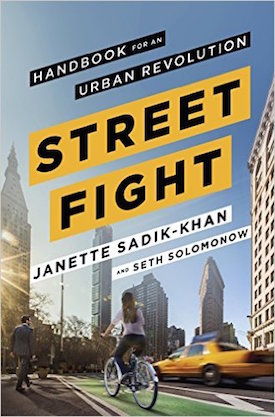
Monday March 21: Janette Sadik-Khan and Mayor Ed Murray
For six incredible years, Janette Sadik-Khan worked as the transportation commissioner of New York City. Her tenure delivered bike lanes, pedestrian-only streets, and additional parks throughout the city. Tonight, she brings her book about that experience, Streetfight: Handbook for an Urban Revolution, to town, with special guest interviewer Mayor Ed Murray. Town Hall, 1119 8th Ave., 652-4255, townhallseattle.org. $32. All ages. 7:30 p.m.
Tuesday March 22: Erick Lyle
Seattle’s not the first city to wrestle with tech-fueled gentrification. San Francisco’s Streetopia art festival examined the way the city was changing and honored the populations that were being left behind. Erick Lyle’s new anthology Streetopia collects essays examining the lessons of the festival; Seattle can learn a lot from this book. (And if you'd like to learn more, I wrote a review of Streetopia earlier this month.) Left Bank Books, 92 Pike St., 622-0195, leftbankbooks.com. Free. All ages. 7:30 p.m.
